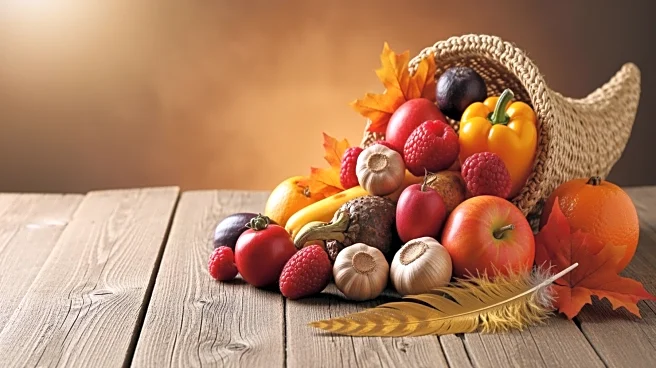What's Happening?
This year's Thanksgiving turkey dinner is set to be significantly more expensive due to an intensifying bird flu outbreak affecting poultry populations across the United States. According to Bernt Nelson, an economist with the American Farm Bureau Federation,
turkey prices may increase by 40%. Purdue's College of Agriculture reports wholesale turkey prices at $1.71 per pound, marking a 75% rise from October 2024. The outbreak of Highly Pathogenic Avian Influenza (HPAI) has led to the death of approximately 3 million turkeys this year, surpassing the 1.25 million fatalities in 2024. Government statistics indicate that this loss accounts for about 1.45% of the nation's turkey population, contributing to a 26% increase in wholesale turkey prices compared to last year. The USDA projects a production of 4.8 billion pounds, a 5% decline from 2024, as the US turkey flock reaches its lowest level in four decades.
Why It's Important?
The surge in turkey prices has significant implications for consumers, particularly during the holiday season when demand for turkey is at its peak. The increased cost may strain household budgets and impact holiday meal planning. Additionally, the outbreak highlights vulnerabilities in the poultry industry, raising concerns about the effectiveness of current federal policies and industry practices. Farm Forward criticizes long-standing federal policies that prioritize profits over public health, suggesting that crowded animal feeding facilities and the lack of mandatory HPAI testing and vaccination programs have exacerbated the spread of the virus. This situation underscores the need for policy reform to better protect public health and stabilize poultry markets.
What's Next?
As the bird flu outbreak continues to affect turkey production, stakeholders may push for changes in federal policies to address the root causes of the spread. There could be increased advocacy for implementing mandatory testing protocols and vaccination programs for poultry, similar to successful strategies in other countries. The poultry industry may also face pressure to adopt more sustainable and health-conscious practices to prevent future outbreaks. Consumers and retailers will likely need to adjust to higher prices and potential shortages during the holiday season, prompting shifts in purchasing behavior and meal planning.
Beyond the Headlines
The ongoing bird flu outbreak and its impact on turkey prices may lead to broader discussions about food security and the sustainability of current agricultural practices. Ethical considerations regarding animal welfare in concentrated feeding operations may gain attention, potentially influencing consumer preferences and driving demand for more humane and environmentally friendly farming methods. The situation also highlights the interconnectedness of public health, agriculture, and economic stability, prompting a reevaluation of how these sectors can better collaborate to prevent similar crises in the future.
















